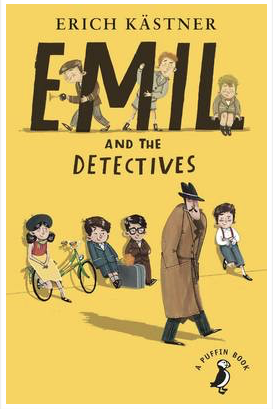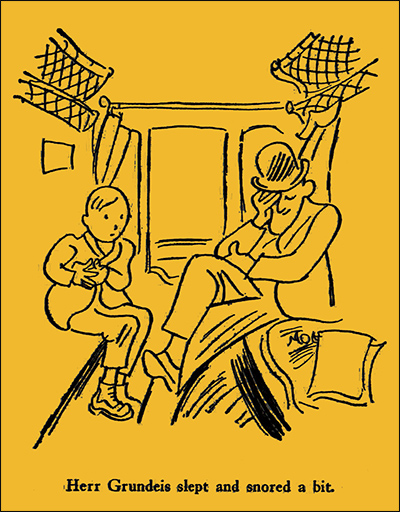 It was a true honor to have been tapped to pick a “Great Read” for The National Children’s Book and Literacy Alliance. I’d like to tell you a bit about my choice: Emil and the Detectives by Erich Kästner.
It was a true honor to have been tapped to pick a “Great Read” for The National Children’s Book and Literacy Alliance. I’d like to tell you a bit about my choice: Emil and the Detectives by Erich Kästner.
I did not have the pleasure of being introduced to Kästner’s 1929 kids’ novel when I was coming up. Instead, I heard it mentioned a few years ago on the incredible Start the Week, the long-running BBC radio 4 chat show (available in the U.S. as a podcast, which I unreservedly recommend!).
The book sounded right up my alley, so I sought it out, read it, and loved it. Most recently I finished reading it to my 5 year old. Chapter books are still somewhat new to her, and it was completely gratifyingly to see her get so caught up in it.
Emil and the Detectives, first written in German in 1929, tells the story of a school-aged young boy from a provincial town who gets to take his first train trip alone to visit relatives in the faraway city of Berlin. Emil’s single mother, who ekes out a modest living washing the hair of the town’s fancier ladies, entrusts her son with a small pocketful of precious cash: 140 marks that Emil is to pass along to his grandmother, who faces financial struggles of her own. But en route, Emil falls asleep in his train compartment.
As he dozes, his pocket gets picked by the same mysterious, mustachioed grownup who offered the lad a piece of candy when he first boarded the train (raising appropriate red flags even in the 1920s). Emil wakes up just as the train is pulling into the vast metropolis. When he discovers his mother’s hard-earned money is gone, he is mortified, and cannot face the dishonor of having failed his mission and his family. Never minding the aunt and cousin waiting for him at the next station, Emil lights out on his own to track down the thief. With luck and derring-do, he spots the man who wronged him. But what can a little boy really do to catch a robber? Especially when he is forestalled from going to the police because, ah, of this little vandalism incident he’s guilty of back home, and hasn’t been caught for yet?
Emil goes on to seek the help of a corps of savvy city kids, who at first take Emil for just some boob from the sticks. From there the kids conspire and plot to help Emil in a way that only little kids can.
What do I think is so great about Emil and the Detectives? There’s an entire laundry list of items—but it mostly has to do with the spot-on portrayal of certain aspects of children and childhood.
To begin with, I love Emil himself. He is an unabashed “good boy” with deep affection for his mother, a sharp work ethic, and respect for family and authority. At the same time, though, the kid has a pulse. He’s not above indulging in boyhood pranks like helping draw a mustache on the statue of some bygone town muckety-muck. And if you insult him or something or someone he cares about, he’s not going to back down from a fight. He’s both a popular goody two shoes and a scamp—not some misunderstood, picked-on, hipster totem like most of the middle grade fiction main characters I come across these days.
 For that matter, it’s so refreshing to see kids struggling in such a truly dangerous yet somehow low-stakes scenario. They are not saving the world. But they are employing their very limited resources—ones totally discounted and unappreciated by adults—to return an almost laughably modest sum of money to its rightful owner. And in so doing they are working to right a wrong committed not so much by one specific grown up against one specific kid, but by the larger category of adults against children in general, whom they see as essentially valueless and easily victimizable with no socially sanctioned modes of redress.
For that matter, it’s so refreshing to see kids struggling in such a truly dangerous yet somehow low-stakes scenario. They are not saving the world. But they are employing their very limited resources—ones totally discounted and unappreciated by adults—to return an almost laughably modest sum of money to its rightful owner. And in so doing they are working to right a wrong committed not so much by one specific grown up against one specific kid, but by the larger category of adults against children in general, whom they see as essentially valueless and easily victimizable with no socially sanctioned modes of redress.
And Kästner just nails the heightened sense of justice that comes with being a kid, as well as the communitarian, role-playing, sometimes stunningly highly organized approach to problem solving that kids engage in with each other at the best of times. It’s hilarious to experience Emil winning over and recruiting a cadre of Berlin youths to help him catch the thief, and just how they set about it.
I also love how Emil and the Detectives explores how kids look at the society they are part of. Emil and his friends discuss things like social class and how parents parent. The book also makes for a vivid and honest rendition of how kids mark the passage of time and observe their surroundings.
I’ll excerpt here one of my favorite passages from the book, which encapsulates all I have spoken of.
To set the scene, our young Emil and the brainiest of his new Berlin friends—nicknamed The Professor—are staking out a hotel in which they believe the thief they are pursuing is spending the night. Although their quarry is oblivious to their presence, there is the danger that he might leave the building at any time on some personal business of his own. So Emil and the Professor have dedicated themselves to staying up through the hours to insure that their stakeout is up to snuff.
The Professor and Emil paced back and forth before the door and talked to each other about their teachers. Then the Professor picked out the differences between the German and foreign license plates that went by until Emil understood a little more about them. And then they thoughtfully ate a sandwich together.
By this time it was dark. Electric ads flamed everywhere. The elevated [train] rumbled overhead. The subway rumbled underneath. Street cars and motor busses, private cars and motorcycles made a crazy concert. Dance music came from the Woerz Cafe. The movie theater on Nollendorf Place began its last show. And many people crowded in.
“Such a big tree as that over by the station looks like a freak here,” mused Emil. ” It looks as if it had lost its way.” The boy was enchanted and thrilled. And he almost forgot why he was there and that he had lost a hundred and forty marks.
“Of course, Berlin is wonderful. You’d think you were sitting in a movie. But I’m not sure whether I’d want to live here always. In Neustadt we have an Upper Market and a Lower Market and a Station Square! And the playgrounds by the river and in Amsel Park. That is all. But still, Professor, I believe it is enough for me. Always such a holiday racket, always a hundred thousand streets and squares? I’d be lost all the time. Imagine if I didn’t have you with me and were standing here all alone! It gives me the creeps to think of it.”
“You get used to it ,” answered the Professor. “Probably I couldn’t stand it in Neustadt, with its three squares and its Amsel Park.”
“You get used to it,” said Emil, “but Berlin is a great sight. No doubt of it, Professor. Wonderful.”
“Is your mother really very strict?” asked the Berlin boy.
“My mother?” asked Emil. “Not a bit of it. She lets me do everything. But I don’t. You understand?”
“No,” the Professor said frankly, “I don’t understand.”
“No? Well, then, I’ll tell you. Have your people much money?”
“I don’t know about that. We don’t talk much about it at home.”
“I guess, when people don’t talk much about it, it means they have plenty of it.”
The Professor considered a moment and then admitted, “That is quite likely.”
“You see. We often talk about it, my mother and I. We have very little. And she has to keep on earning, and still there’s hardly ever enough to make both ends meet. But when we have a class excursion my mother gives me just as much money as any of the other boys get. Sometimes even more.”
“How can she, though?”
“That I don’t know. But she can. And then I bring half of it back.”
“Does she want you to?”
“Silly! I want to!”
“Uhuh!” said the Professor. “That’s the way it is.”
“Yes, just like that. And if she lets me go out into the country with Protzsch, who lives upstairs, and stay until nine o’clock, I come back by seven because I don’t want her to sit in the kitchen and eat her supper alone. Of course, she wanted me to stay with the others. And I tried it, too. But it wasn’t any fun. Anyway inside she is glad that I come home early.”
“Uhm,” said the Professor, “it’s entirely different at our house. If I really come home on time I can bet that they’ll be at the theater or invited out somewhere. We like each other all right. I must say that. But we don’t make any fuss about it.”
“That is the only thing we can afford. But that doesn’t make me a mamma’s baby, not by a long shot. And if anybody doesn’t believe that, I’ll smash him
against the wall. That’s very simple to understand.”
“I do understand.”
The two boys stood for a while in the gateway without speaking. Night came. And the moon peeped with one eye over the elevated.
The Professor cleared his throat and asked without looking at the other, “You’ re pretty fond of each other, aren’t you?”
“Frightfully,” answered Emil.
Check out all the National Children’s Book and Literary Alliance “Great Reads” at their website. And find your copy of Emil and the Detectives here.
